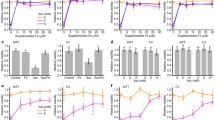Abstract
Tumor metastasis and invasion were shown to be inhibited by the 2-O-phosphorylated form (Asc2P) of l-ascorbic acid (Asc); intact Asc did not inhibit tumor invasion when added once, but appreciably inhibited it upon repeated addition. The anti-metastatic effect is attributable to a marked enrichment of intracellular Asc by Asc2P, subsequently dephosphorylated. Asc2P scavenged most of the intracellular reactive oxygen species (ROSin), and notably inhibited production of matrix metalloproteases and cell motility. ROSin was decreased by Asc2P more markedly than by Asc added once. Thus, involvement of ROSin in tumor invasion and a potent anti-metastatic therapy by ROSin-decreasing agents are suggested.
Similar content being viewed by others
Author information
Authors and Affiliations
Additional information
Received: 24 November 1999 / Accepted: 28 February 2000
Rights and permissions
About this article
Cite this article
Nagao, N., Nakayama, T., Etoh, T. et al. Tumor invasion is inhibited by phosphorylated ascorbate via enrichment of intracellular vitamin C and decreasing of oxidative stress. J Cancer Res Clin Oncol 126, 511–518 (2000). https://doi.org/10.1007/s004320000120
Issue Date:
DOI: https://doi.org/10.1007/s004320000120




